
Unique global Down syndrome study to seek new ways to prevent Alzheimer’s
TALLAGHT University Hospital (TUH) is preparing to participate in a unique global study
TUH’s brain health clinic, the Institute of Memory & Cognition, is one of just 17 sites globally that is participating in the study, and one of four in Europe.
The Trial Ready Cohort for Down syndrome (TRC-DS) study will be based at the National Intellectual Disability Memory Service in TUH.
The service will be inviting adults with Down syndrome who want to help researchers learn more about memory and thinking problems, such as Alzheimer’s disease.
This project is part of an international collaboration to improve care and outcomes for people with Down syndrome – funded by the US National Institutes of Health, and sponsored by the Alzheimer’s Therapeutic Research Institute at the University of Southern California.
Participation in the study in Ireland will be led by Professor Seán Kennelly, and his colleagues in the National Intellectual Disability Memory Service.
It will follow participants aged 25 to 55 for almost three years, including regular check-ups such as memory tests, blood tests, and brain scans (MRI).
The goal is to understand how and why changes happen in the brain so that new treatments or ways to prevent dementia in people with Down syndrome can be developed.
Another important aim of the study is to establish a trial-ready cohort for rapid enrolment in future Alzheimer’s clinical trials, ensuring that adults with Down syndrome have the opportunity to participate in these important studies.
Professor Seán Kennelly, Study Principle investigator & Clinical Director of National Intellectual Disability Memory Service at TUH said: “This landmark study represents a vital step forward in understanding how Alzheimer’s disease develops in people with Down syndrome.
“At the National Intellectual Disability Memory Service in TUH, we are proud to be part of an international effort that places people with
intellectual disability at the forefront of brain health research.
“It is our hope that this work will not only accelerate future treatments but also ensure that people with Down syndrome are included in the breakthroughs to come.”
Participation in the study is voluntary and there is no cost to take part.
To be eligible to join the study participants must be healthy people between the ages of 25 to 55 with Down syndrome, have an interest in supporting clinical research and be prepared to visit the National Intellectual Disability Memory Service in TUH once every 16 months for physical exams.

